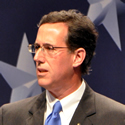National
Santorum wins in Alabama, Mississippi
Gingrich fades; Romney takes Hawaii

Republican presidential hopeful Rick Santorum scored two wins in the GOP primaries on Tuesday by adding Alabama and Mississippi to his column after prevailing in Kansas over the weekend.
The former U.S. senator, who’s known for his strong opposition to same-sex marriage and other anti-gay views, edged out his competitors in the most recent contests — former Massachusetts Gov. Mitt Romney, former U.S. House Speaker Newt Gingrich and libertarian Rep. Ron Paul (R-Texas).
In Alabama, Santorum won 35 percent of the vote with 98 percent of precincts reporting. Gingrich and Romney were tied with 29 percent of the vote.
In Mississippi, with 99 percent of precincts reporting, Santorum captured 33 percent of the vote, while Gingrich had 31 percent and Romney had 30 percent. Hawaii also held a contest on Tuesday; Romney won there with 45 percent of the vote to Santorum’s 25 percent and Gingrich’s 11.
Speaking at his campaign headquarters at Lafayette, La., Tuesday night, Santorum told supporters, “We did it again.”
“The most common thing I heard from people — and I know I’m not alone — is people come up and say, ‘I’m praying for you,'” Santorum said. “I just want to thank you for that. I want to thank God for giving us the strength everyday to go out there and to be clear in our message and our vision for this country.”
Santorum said the “best chance” for Republicans to win the November election is to nominate a conservative — likely a reference to Romney, who’s viewed as a more moderate candidate — and said he expects to have “a huge win” in the Louisiana primary, which will have its contest on March 24.
Hastings Wyman, who’s gay and editor of the Southern Political Report, said the results on Tuesday give Santorum “a big boost” — mostly because they show Santorum’s competitor as the anti-Romney alternative, Gingrich, has run out of steam.
“It sends a strong message to Gingrich that it’s time he got out,” Wyman said. “I don’t know whether he will or not, but if he can’t win those two states, there’s nowhere else he can win really.”
Although Romney has amassed more delegates leading up to the convention than either Santorum or Gingrich, Wyman said Santorum’s wins show he continues to have strength and could give Romney a run for his money for the Republican presidential nomination.
“I think Santorum is going to give Romney a strong race,” Wyman said. “He’s more youthful. The polls show he does very well with women, and think that’s because they find him personally attractive. I don’t mean some sort of sexually way, or anything like that. It’s just he’s young and handsome and they kind of like him. Romney’s too aloof, Gingrich is too cerebral, Paul is kind of the class nerd. I think Santorum comes across as somebody they really like.”
The candidate’s wins on Tuesday build off of his win on Saturday in the Kansas caucuses. Santorum won a majority of the vote in the state, while Romney came in a distant second with 20.9 percent of the vote.
But Thomas Witt, chair of the Kansas Equality Coalition, said he doesn’t think Santorum’s win in the state amounted to much because of the low turnout in the primary.
“I think there’s some perspective we can put Santorum’s victory in here,” Witt said. “There’s about 725,000 registered Republicans in the State of Kansas. Fewer than 30,000 participated in the caucuses. Of those, 15,000 voted for Santorum. That’s 2 percent of the Republicans in Kansas voting for Santorum. Polls have margins of error bigger than the number of Republicans that voted for him.”
Witt said he’s unaware of any anti-gay rhetoric that Santorum may have employed while campaigning in Kansas, which is known for being a socially conservative state. The activist said he followed news coverage carefully and talked to people at one of Santorum’s events in Topeka, but nothing related to LGBT issues came up.
Santorum is known for his opposition to LGBT rights. He’s signed a pledge from the National Organization for Marriage committing himself to back a U.S. constitutional amendment banning same-sex marriage throughout the country, defend the Defense of Marriage Act in court and establish a commission of “religious liberty” to investigate the alleged harassment of those opposed to same-sex marriage. He has also said he would restore “Don’t Ask, Don’t Tell” if elected president.
Other contests on Saturday took place in U.S. protectorates: Guam, the Northern Mariana Islands and the U.S. Virgin Islands. Romney won in the first two places. Paul won the Virgin Islands, but Romney took more delegates because of the system there.
The next contest is set to be the Missouri caucuses on Thursday. Santorum won the primary in the state on Feb. 7, but his win was symbolic because delegates weren’t awarded then. Missouri has 52 delegates up for grabs during its caucuses. Following Missouri, the next contest will be Puerto Rico on Friday, Illinois on Sunday and Louisiana on March 24.
State Department
State Department releases annual human rights report
Antony Blinken reiterates criticism of Uganda’s Anti-Homosexuality Act

Secretary of State Antony Blinken on Monday once again reiterated his criticism of Uganda’s Anti-Homosexuality Act upon release of the State Department’s annual human rights report.
“This year’s report also captures human rights abuses against members of vulnerable communities,” he told reporters. “In Afghanistan, the Taliban have limited work opportunities for women, shuttered institutions found educating girls, and increasing floggings for women and men accused of, quote, ‘immoral behavior,’ end quote. Uganda passed a draconian and discriminatory Anti-Homosexuality Act, threatening LGBTQI+ individuals with life imprisonment, even death, simply for being with the person they loved.”
Ugandan President Yoweri Museveni last May signed the law, which contains a death penalty provision for “aggravated homosexuality.”
The U.S. subsequently imposed visa restrictions on Ugandan officials and removed the country from a program that allows sub-Saharan African countries to trade duty-free with the U.S. The World Bank Group also announced the suspension of new loans to Uganda.
Uganda’s Constitutional Court earlier this month refused to “nullify the Anti-Homosexuality Act in its totality.” More than a dozen Ugandan LGBTQ activists have appealed the ruling.
Clare Byarugaba of Chapter Four Uganda, a Ugandan LGBTQ rights group, on Monday met with National Security Council Chief-of-Staff Curtis Ried. Jay Gilliam, the senior LGBTQI+ coordinator for the U.S. Agency for International Development, in February traveled to Uganda and met with LGBTQ activists who discussed the Anti-Homosexuality Act’s impact.
“LGBTQI+ activists reported police arrested numerous individuals on the basis of their sexual orientation or gender identity and subjected many to forced anal exams, a medically discredited practice with no evidentiary value that was considered a form of cruel, inhuman, and degrading treatment and could amount to torture,” reads the human rights report.
The report, among other things, also notes Ugandan human rights activists “reported numerous instances of state and non-state actor violence and harassment against LGBTQI+ persons and noted authorities did not adequately investigate the cases.”
Report highlights anti-LGBTQ crackdowns in Ghana, Hungary, Russia
Ghanaian lawmakers on Feb. 28 approved the Promotion of Proper Human Sexual Rights and Ghanaian Family Values Bill. The country’s president, Nana Akufo-Addo, has said he will not sign the measure until the Ghanaian Supreme Court rules on whether it is constitutional or not.
The human rights report notes “laws criminalizing consensual same-sex sexual conduct between adults” and “crimes involving violence or threats of violence targeting lesbian, gay, bisexual, transgender, queer or intersex persons” are among the “significant human rights issues” in Ghana.
The report documents Hungarian Prime Minister Viktor Orbán and members of his right-wing Fidesz party’s continued rhetoric against “gender ideology.” It also notes Russia’s ongoing crackdown against LGBTQ people that includes reports of “state actors committed violence against LGBTQI+ individuals based on their sexual orientation or gender identity, particularly in Chechnya.”
The report specifically notes Russian President Vladimir Putin on July 24 signed a law that bans “legal gender recognition, medical interventions aimed at changing the sex of a person, and gender-affirming care.” It also points out Papua New Guinea is among the countries in which consensual same-sex sexual relations remain criminalized.

The Cook Islands and Mauritius in decriminalized homosexuality in 2023.
The report notes the Namibia Supreme Court last May ruled the country must recognize same-sex marriages legally performed outside the country. The report also highlights the Indian Supreme Court’s ruling against marriage equality that it issued last October. (It later announced it would consider an appeal of the decision.)
Congress requires the State Department to release a human rights report each year.
The Biden-Harris administration in 2021 released a memorandum that committed the U.S. to promoting LGBTQ+ and intersex rights abroad.
The full report can be read here.
National
Same-sex couples vulnerable to adverse effects of climate change
Williams Institute report based on Census, federal agencies

A new report by the Williams Institute at the UCLA School of Law finds that same-sex couples are at greater risk of experiencing the adverse effects of climate change compared to different-sex couples.
LGBTQ people in same-sex couple households disproportionately live in coastal areas and cities and areas with poorer infrastructure and less access to resources, making them more vulnerable to climate hazards.
Using U.S. Census data and climate risk assessment data from NASA and the Federal Emergency Management Agency, researchers conducted a geographic analysis to assess the climate risk impacting same-sex couples. NASA’s risk assessment focuses on changes to meteorological patterns, infrastructure and built environment, and the presence of at-risk populations. FEMA’s assessment focuses on changes in the occurrence of severe weather events, accounting for at-risk populations, the availability of services, and access to resources.
Results show counties with a higher proportion of same-sex couples are, on average, at increased risk from environmental, infrastructure, and social vulnerabilities due to climate change.
“Given the disparate impact of climate change on LGBTQ populations, climate change policies, including disaster preparedness, response, and recovery plans, must address the specific needs and vulnerabilities facing LGBTQ people,” said study co-author Ari Shaw, senior fellow and director of international programs at the Williams Institute. “Policies should focus on mitigating discriminatory housing and urban development practices, making shelters safe spaces for LGBT people, and ensuring that relief aid reaches displaced LGBTQ individuals and families.”
“Factors underlying the geographic vulnerability are crucial to understanding why same-sex couples are threatened by climate change and whether the findings in our study apply to the broader LGBTQ population,” said study co-author Lindsay Mahowald, research data analyst at the Williams Institute. “More research is needed to examine how disparities in housing, employment, and health care among LGBT people compound the geographic vulnerabilities to climate change.”
Read the report
Federal Government
Lambda Legal praises Biden-Harris administration’s finalized Title IX regulations
New rules to take effect Aug. 1

The Biden-Harris administration’s revised Title IX policy “protects LGBTQ+ students from discrimination and other abuse,” Lambda Legal said in a statement praising the U.S. Department of Education’s issuance of the final rule on Friday.
Slated to take effect on Aug. 1, the new regulations constitute an expansion of the 1972 Title IX civil rights law, which prohibits sex-based discrimination in education programs that receive federal funding.
Pursuant to the U.S. Supreme Court’s ruling in the landmark 2020 Bostock v. Clayton County case, the department’s revised policy clarifies that discrimination on the basis of sexual orientation and gender identity constitutes sex-based discrimination as defined under the law.
“These regulations make it crystal clear that everyone can access schools that are safe, welcoming and that respect their rights,” Education Secretary Miguel Cardona said during a call with reporters on Thursday.
While the new rule does not provide guidance on whether schools must allow transgender students to play on sports teams corresponding with their gender identity to comply with Title IX, the question is addressed in a separate rule proposed by the agency in April.
The administration’s new policy also reverses some Trump-era Title IX rules governing how schools must respond to reports of sexual harassment and sexual assault, which were widely seen as imbalanced in favor of the accused.
Jennifer Klein, the director of the White House Gender Policy Council, said during Thursday’s call that the department sought to strike a balance with respect to these issues, “reaffirming our longstanding commitment to fundamental fairness.”
“We applaud the Biden administration’s action to rescind the legally unsound, cruel, and dangerous sexual harassment and assault rule of the previous administration,” Lambda Legal Nonbinary and Transgender Rights Project Director Sasha Buchert said in the group’s statement on Friday.
“Today’s rule instead appropriately underscores that Title IX’s civil rights protections clearly cover LGBTQ+ students, as well as survivors and pregnant and parenting students across race and gender identity,” she said. “Schools must be places where students can learn and thrive free of harassment, discrimination, and other abuse.”
-

 South America4 days ago
South America4 days agoDaniel Zamudio murderer’s parole request denied
-

 Maryland5 days ago
Maryland5 days agoMontgomery County police chief discusses arrest of trans student charged with planned school shooting
-

 State Department22 hours ago
State Department22 hours agoState Department releases annual human rights report
-

 Theater4 days ago
Theater4 days ago‘Amm(i)gone’ explores family, queerness, and faith









